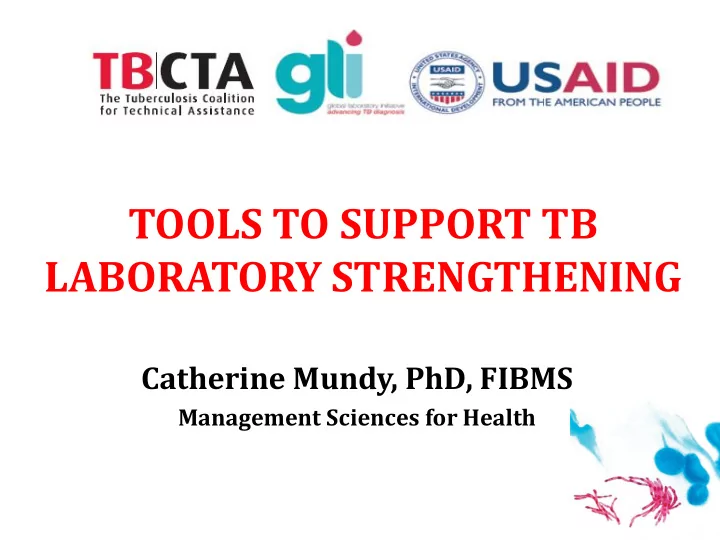

TOOLS TO SUPPORT TB LABORATORY STRENGTHENING Catherine Mundy, PhD, FIBMS Management Sciences for Health
What is TBCTA? The Tuberculosis Coalition for Technical Assistance (TBCTA) is a coalition of major international partners in TB control: – American Thoracic Society (ATS), – Centers for Disease Control and Prevention (CDC), – Family Health International (FHI), – International Union Against Tuberculosis and Lung Disease (The Union), – Japan Anti-Tuberculosis Association (JATA), – KNCV Tuberculosis Foundation, – Management Sciences for Health (MSH), – World Health Organization (WHO).
What is TBCAP TBCAP – USAID 5 year cooperative agreement (2005 – 2010) • Awarded to TBCTA with KNCV as the lead partner • ‘To pursue high quality DOTS expansion and enhancement of case detection through quality assured bacteriology’. • Activities include TB laboratory strengthening projects – at global, regional and country levels
Today’s presentation 1. Purpose and description of the TB laboratory tools 2. Dissemination and implementation of the tools 3. Regional workshops in Africa and Asia 4. Discussion: Challenges with in-country implementation of the lab tools
TB CAP Toolbox to strengthen laboratory services 1. Directly supports Stop TB Strategy objectives: • ‘To achieve universal access to high -quality diagnosis and patient- centered treatment’ • ‘To pursue high quality DOTS expansion and enhancement of case detection through quality assured bacteriology’. 2. Enables countries to: • Strengthen their TB laboratory network • Adopt national standards in accordance with international guidelines.
TBCAP Laboratory Tools
TB CAP Laboratory Tools in progress • Manual on biosafety for laboratories
Road Map for Laboratory Strengthening A structured framework for scaling-up TB laboratory services Based on WHO-recommended norms and standards documented country best-practices growing lessons learnt from field experiences by many partners involved in the Global Laboratory Initiative (GLI).
Standard Operating Procedures Section I. Guidance for countries to develop (or modify) and implement country-specific Standard Operating Procedures Section II. Generic TB laboratory Standard Operating Procedures : Safety Use and maintenance of equipment Preparation of reagents Test procedures
Logistics, Equipment and Supply Management Part A: Guidelines for effective management of TB laboratory commodities Procurement mechanisms, logistics, quantification and management systems. Part B: Technical specifications for equipment, consumables and reagents Additional requirements for specialized equipment (e.g. Fluorescence microscopes, Microbiological safety cabinets)
External Quality Assurance Training package for AFB microscopy EQA for Light and Fluorescence Microscopy Training package for EQA Panel Tests Blinded rechecking Analysis and reporting of results Supervision
Culture and DST Training Package Covers all aspects of culture and DST 12 modules Trainers’ manual Participants’ manual
Laboratory Management Information Systems Tools for reporting and monitoring of AFB smears, culture/DST and supplies Promotes correct analysis, re-checking EQA parameters and culture internal quality control
Dissemination and implementation of the laboratory tools
Timetable • December 2009 – Official Launch in Cancun • March 2010 – TOT workshop – The Hague • April 2010 – Regional workshop, Nairobi for TBCAP supported countries in Africa • July 2010 – Regional Workshop, Jakarta for TBCAP supported countries in Asia • ONGOING: Implementation of country action plans by teams attending the workshops
TOT Workshop March 2010 • Trained TB laboratory consultants on use and implementation of the TB laboratory tools • Trainers selected for the regional workshops in Africa and Asia
Regional Workshops in Africa and Asia Participating Country teams: Afghanistan Kenya Bangladesh Uganda Cambodia Ethiopia Indonesia Nigeria Pakistan Ghana Vietnam Namibia
Objectives of the workshops • To orientate country teams and develop their skills for effective decision making, planning and implementation of the TBCAP lab Tools Package in their respective countries
Workshop organization and content • Team approach – ‘interactive’ • Baseline situation analysis • Identification and prioritization of current TB lab challenges • Tool orientation • Action planning
Action plan focus: Africa KENYA: Review/revise/standardize microscopy SOPs UGANDA: Revise &standardize microscopy SOPs ETHIOPIA : Assess adequacy of equipment and supplies in microscopy sites to implement microscopy SOPS NIGERIA: Arrange TOT workshop and develop and customize materials for TOT. GHANA: Prepare draft copy of microscopy SOPs, ready for approval and printing NAMIBIA : Update existing SOPs, pilot and seek approval.
Action plan focus: Asia AFGHANISTAN: Use Culture/DST tool to train lab techs in preparation for opening the NRL & 3 regional culture labs. CAMBODIA: Improve EQA results in 12 poorly performing microscopy labs INDONESIA: Update and integrate 38 TB lab SOPs PAKISTAN: Implement SOPs & MIS for culture/DST in 2 of the 4 provincial labs. BANGLADESH: Submit action plan, budget & request for approval/release of funds to set up 4 new culture facilities, including equipment /supplies VIETNAM : Develop curriculum & materials for TB culture refresher training course
Challenges with in-country implementation of lab tools • Numerous lab challenges, particularly in Africa • Political will, motivation & commitment • Relationship between NTP and labs • Leadership capacity • Human and financial resources
How should we proceed in the next 5 years? • Should we focus at the individual country level? • Questions and open discussion
Recommend
More recommend